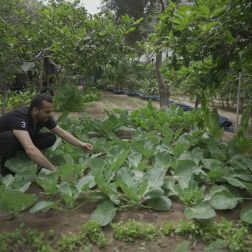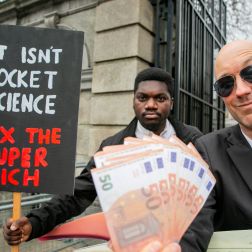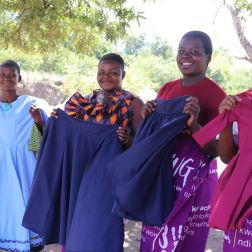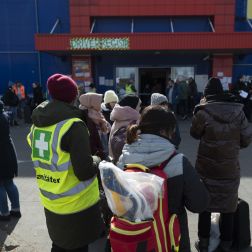- 7 mins read time
- Published: 12th February 2016
Entertain, educate, organise: how radio supports development
To mark World Radio Day on Saturday 13th February, Oxfam celebrates how radio impacts millions of people every day, and remains an important tool for development and a lifeline in times of emergency.
Oxfam uses radio as a vital medium in its overseas programme work tackling poverty and assisting vulnerable people during humanitarian crisis.
Radio dramas and entertainment/education campaigns offer the potential to deliver critical information to those who need it most across vast geographic distances via compelling, entertaining programming.
In Tanzania, for example, Oxfam is supporting a community station, Radio Lolondo FM, by helping to provide equipment, solar powered energy supplies and salaries, as it works to raise awareness about development work in Tanzania. The station educates people about Oxfam’s livelihood projects which help people grow more crops and set up their own co-ops, among other things, as well our campaign against violence on women and girls in Tanzania.
One of its broadcasters, Janet Mbunito explains radio’s benefits and its immediacy as a communications tool for essential information: “Newspapers are slow getting here and few can read them. With radio, we can bring the news of Arusha and of Tanzania quickly and the key is to broadcast local issues in the local language.
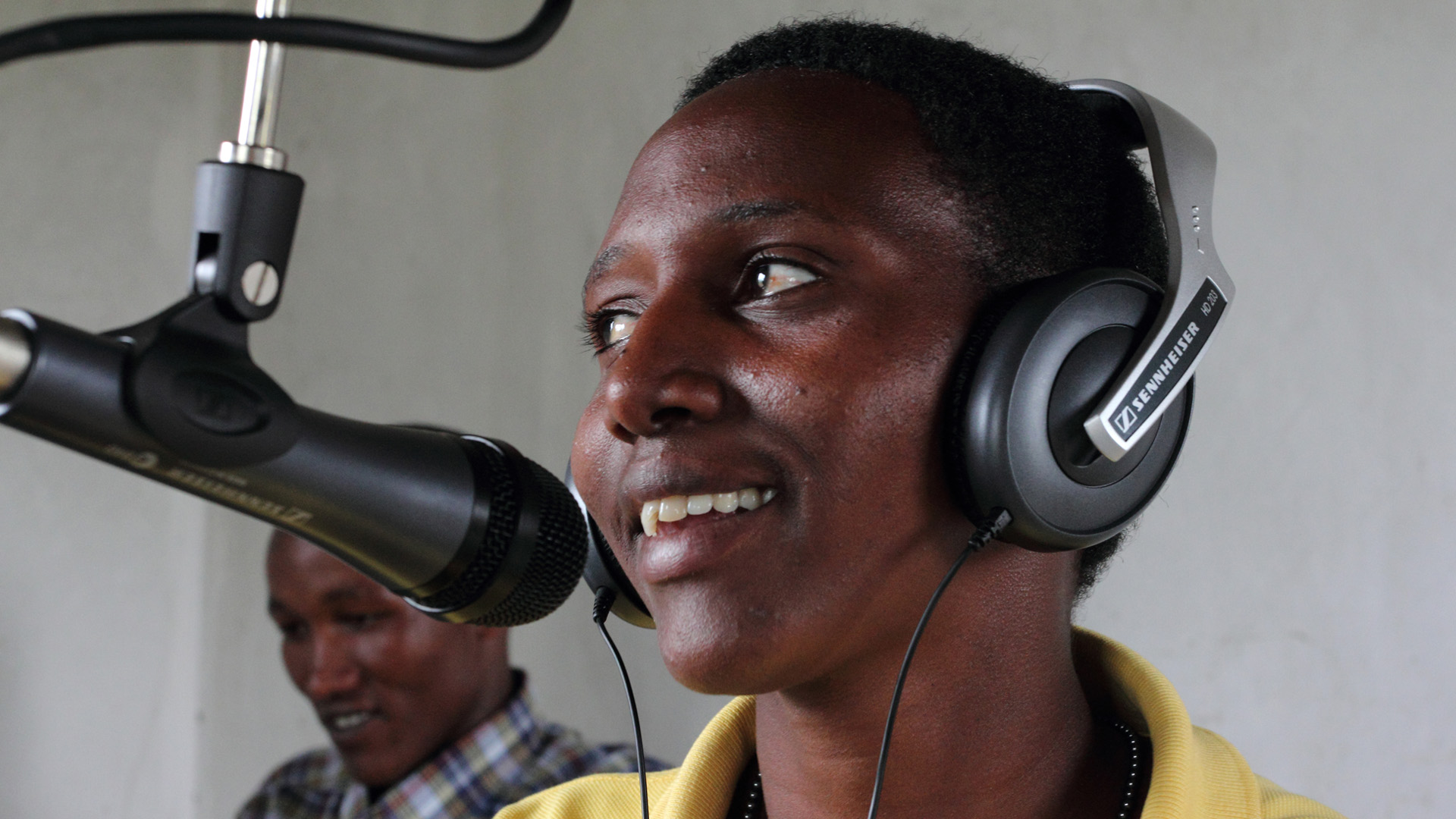
Janet Mbunito during a broadcast by Radio Lolondo FM, an Oxfam-supported station in Tanzania. Photo: Geoff Sayer/Oxfam
“We play music, take phone calls, and bring people in from the villages to talk. The station is here to entertain, to educate and to support development...”
Similarly, Oxfam and its partners in Haiti have developed a radio drama to change and influence knowledge, attitudes and behaviours amongst local communities, tackling issues such as nutrition, gender-based violence, destruction of natural resources, cholera, and safe hygiene practices.
And in Liberia in 2015, Oxfam helped to develop radio jingles and a drama about the signs and symptoms of Ebola, which were broadcast via radio for four days nationwide. In Sierra Leone, the Radio Bintumani station in Koinadugu district also played jingles to highlight the signs and symptoms of Ebola and how to prevent it. Steven Bockarie Mansaray, the station manager, says that the promotion of health messages was key to keeping Ebola out of the district for so long.
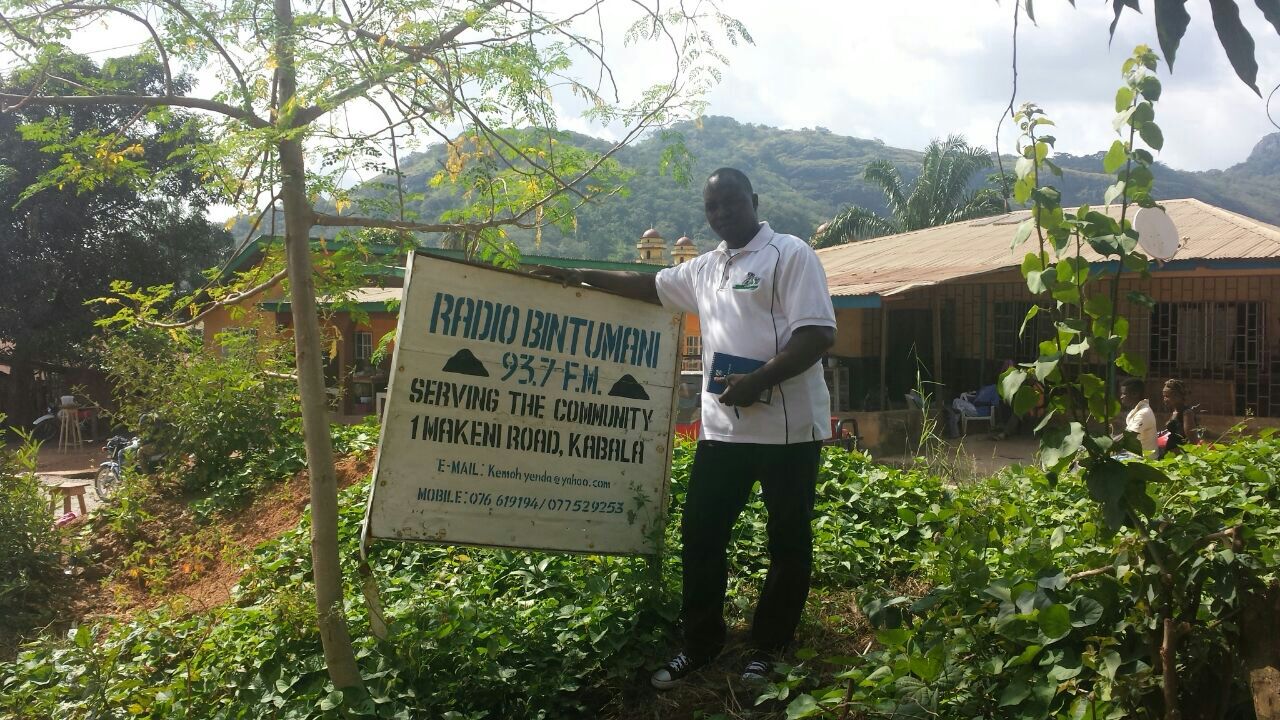
Steven Bockarie Mansaray is the manager of Radio Bintumani in Sierra Leone. The district station played jingles to highlight the signs and symptoms of Ebola and how to prevent it.
Credit: Holly Taylor/Oxfam
Nepal is another powerful example of the positive role that radio can play in Oxfam’s humanitarian work.
Following the two devastating earthquakes that hit the region in April and May 2015, Oxfam quickly responded, ensuring safe and equal access to water and sanitation facilities, and provision of basic needs such as food, cash and hygiene materials.
However, as our community mobilisation teams in Nepal hit the ground to ask communities what they needed and to better understand the challenges they faced, it soon became apparent that in addition to basic essentials there was more we could do to help connect communities with information.
As Simone Carter, Oxfam Community Mobiliser and Public Health Promoter, says: “Families had lost access to information; their radios and TVs had been destroyed or buried in the earthquake, and travelling to access this information was impossible at the time.
“People were also confused about how to access the much-needed aid from the numerous organisations and relief agencies. This information gap resulted in rumours and questions about everything from selection criteria for reconstruction grants, to myths regarding the next earthquake.
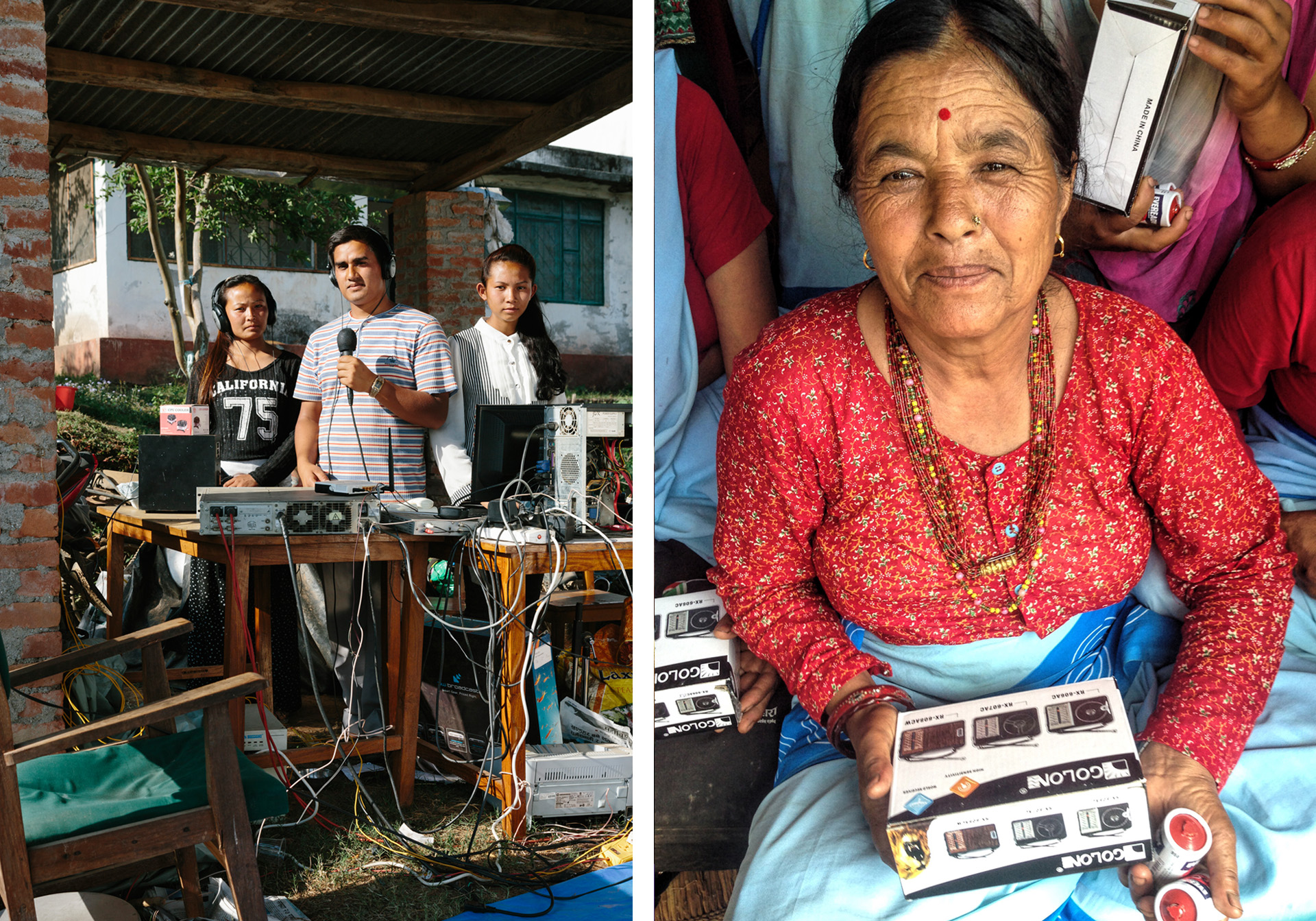
Above: Radio Sindhu DJs Gurash Gureng (22), Deepak Khatri (23), and Asmi Tamang (21) in Nepal. After the earthquake made their station building unsafe they relocated to this open bike shed and set up their equipment for broadcast. The team received regular missing persons calls and helped to reunite people with their families. Photo: Aubrey Wade/Oxfam A Nepalese woman with one of the radios distributed by Oxfam, following the devastating earthquakes in 2015. Credit: Oxfam
“An organisation focused on improving access to information in affected communities, Internews, was in Nepal running a programme called OpenMic Rumour Tracking, which they had first trialled in Liberia with Ebola.
“They collected rumours from communities and then published a weekly report in English and Nepali comparing these common rumours to facts, as well as providing contact details for people who could provide further information.
“Oxfam teams did not have a channel to disseminate the information, so we decided to partner with a local community station, Radio Sindhu, to produce a programme, including a section on myth de-bunking.”
The earthquake had made Radio Sindhu’s building unsafe to operate in, and soon the station was receiving calls from people across the area saying they could not hear its shows.
Despite difficulties in getting supplies to the region, the station was given a new aerial, they relocated to an open bike shed, got hold of fuel for the generator and set up their equipment for broadcast. Radio Sindhu was broadcasting around the clock within two days of the earthquake. The team received regular missing persons calls and helped to reunite people with their families.
Simone Carter explains: “Internews provided capacity building to help the station produce the show with Oxfam, and our community mobilisers worked with communities to gather the content.
“By working through local radio we have been able to provide communities with the information they want and need, in a way that they find accessible, and which is part of their daily life. The show has been so successful that other local stations have been airing it as well.
“Topics have included health, gender, humanitarian assistance and government programming. Other topics addressed by the show have included preparing for winter, how to tell if your child has trauma, and success stories of communities recovery and rebuilding.
“By also inviting other organisations including the Red Cross and government agencies to be on the show, we encouraged communities to listen to just one station, with one show that aims to address their key concerns. The show has been running since June 2015 and although there are some national radio equivalents it is the only local radio show with community dialogue, focused on serving the needs of the community post-earthquake.
“Oxfam distributed over 1,000 radios to women's groups and youth groups to encourage members to listen. The show is replayed at four different times and on two different stations, allowing these groups different opportunities to sit together and listen. Our community mobilisers and the female community health volunteers also carry recorded versions of the show to play during community visits. This means that when our teams arrive in communities and they bring up key issues, they can play the episode on that topic or take note of the issue and organise an upcoming episode to address it.
“We are now trying to do live segments from communities and to have story collection done by the radio station, encouraging the station to take more ownership of the programme, so that it will be sustainable in the long-term.
“Not only do the radio shows provide key information to communities, they also serve as a constructive forum for the community to discuss and share information and experiences among themselves. We have hosted children's groups, promoted community events and showcased local talent.
“The show has done more than inform, it has helped to grow and strengthen community bonds, bringing people together in the process of recovery and reconstruction after the earthquakes.”
You can help support Oxfam projects worldwide by making a donation.
